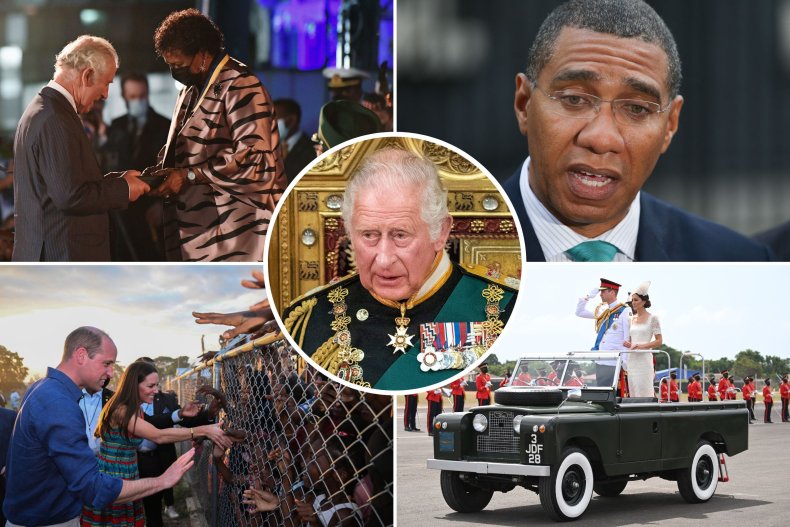King Charles' Monarchy Is Already Unraveling Before His Coronation
King Charles III waited 70 years for the throne, but now Caribbean countries are making moves to become republics before he has even been crowned.
Jamaica will likely be the first Commonwealth member that will hold a referendum on removing Charles as head of state. On March 22, its prime minister Andrew Holness announced "ambitious timelines" for the process.
Holness wrote on Twitter: "The Government of Jamaica is embarking on the most comprehensive constitutional reform work to transform Jamaica from a Constitutional Monarchy to a Republic.
"The goal is to ultimately produce a new Constitution of Jamaica, establishing the Republic of Jamaica and affirming our self-determination and cultural heritage. Let's begin the #RoadToRepublic."
Intentionally or not, the announcement comes exactly a year after Prince William and Kate Middleton's disastrous visit to Jamaica, which was marred by political protests and PR gaffes.

The couple and their aides were criticized for photos showing them greeting children through a wire fence in Trench Town and for the colonial-style imagery of a picture of them inspecting Jamaican soldiers from a Land Rover.
Professor Rosalea Hamilton, a Jamaican academic and campaigner, was involved in organizing the protests against the royal visit in 2022 and told Newsweek that she wanted to see Holness turn his words into action.
"I'm encouraged by the words," she said. "[Holness] talks about making sure the public is not simply a bystander. Fully support that approach but it's not necessarily reflected in what has happened to date. There has been no public education and public engagement up to this point and we are talking more than a year."
In terms of the outcome of a referendum, she said: "It all depends on how the republican issue and the question is framed."
Hamilton argued that the republican cause would benefit from a focus "on moving to a different arrangement in which we can make the Jamaican people sovereign and we can address some of the concerns that the Jamaican people face, including bread-and-butter issues."
She added: "We're struggling for wages and a decent standard of living. If we frame the move to the republic in those terms and not simply to remove the king as head of state then I'm confident that the Jamaican people will respond positively."
Graham Smith, chief executive of U.K. campaign group Republic, told Newsweek: "I welcome the announcement and I think it's the beginning of the end for monarchies in the Caribbean. I imagine it will jolt other countries to up their game and start doing the same, from New Zealand to Canada and everyone in between.
"Particularly overseas, I think a lot of countries aren't that interested. I was speaking to our New Zealand counterpart who said people in New Zealand are not going to be paying much attention to the coronation and I think that's the case across the Commonwealth.
"That's a sideshow and their main priority is getting on with their domestic concerns and their constitution."
Antigua and Barbuda indicated its desire to cut ties with the British crown days after the death of Queen Elizabeth II, when the U.K. was still in official mourning.
There have also been swings against the monarchy in polling from Canada and Australia, suggesting the crisis of confidence is spreading among the Commonwealth realms—the countries that count the king as head of state.
This all sets the stage for a campaign Smith's group is running in Britain.
The day after Holness' announcement, Republic activists unfurled a banner in Westminster Abbey, in the exact spot where Charles will sit when he is crowned on May 6. It read: "Would you vote for him?"
We just put ourselves right where Charles will be on May 6. In the Abbey, where the throne will be standing.
— Republic (@RepublicStaff) March 23, 2023
There is no symbol that better represents the fundamental travesty of our democracy than the coronation throne in Westminster Abbey. #NotMyKing pic.twitter.com/KwY7XVqZLO
The question is rather on the nose for the king. As recently as May 2022, a poll found that 37 percent of Britons wanted Prince William to succeed Elizabeth, compared to 34 percent who wanted Charles.
The monarchy remains popular in Britain overall, but a potential crisis could be coming down the line: polling in January showed a swing against the monarchy among 18 to 24-year-olds.
Asked whether Charles should be replaced with an elected head of state, 52 percent agreed, compared to 35 percent who disagreed.
Buckingham Palace has much to do before the coronation on May 6. After the pageantry, courtiers will have to work just as hard to shore up Charles' reign in the face of threats from multiple directions, including Prince Harry's broadsides, Prince Andrew's connection to Jeffrey Epstein and Britain's colonial history.
While the departure of countries such as Jamaica would no doubt be a blow for Charles, it may not necessarily be a surprise.
Ingrid Seward, author of Prince Philip Revealed, told Newsweek: "I'm not surprised. They were making a lot of noise about it before. At least they're having a referendum and not just saying, 'Right, we're going to become independent.'
"I think a lot of countries now will. A lot said it's fine when the queen's there but the minute she's gone, we want to be independent. But it doesn't mean they can't still be in the Commonwealth. It's a change in reign and it's a moment in time.
"I don't think that Charles will be unduly distressed by it. It's something that he hoped wouldn't happen but probably thought it would because he's very forward thinking."
Jack Royston is chief royal correspondent for Newsweek, based in London. You can find him on Twitter at @jack_royston and read his stories on Newsweek's The Royals Facebook page.
Do you have a question about King Charles III, William and Kate, Meghan and Harry, or their family that you would like our experienced royal correspondents to answer? Email royals@newsweek.com. We'd love to hear from you.

